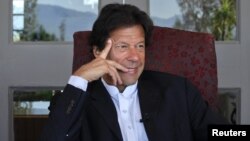ISLAMABAD —
Pakistani cricketeer turned opposition politician Imran Khan is dismissing government warnings about marching into South Waziristan to protest U.S. drone strikes. Some analysts say Saturday's scheduled protest is the latest move by Khan to boost the prospects of his political party.
Khan says his so-called peace march will leave for South Waziristan on Saturday. He says the convoy has been invited into the area and promised security by the three main tribes in the tribal agency -- a known militant stronghold.
Authorities have said they cannot guarantee the safety of the marchers. Khan says he is confident of security even though foreigners will be participating in the planned protest.
“We will take it as it comes," he said. "We know exactly where we are going, we worked out with local people what is the most secure place because obviously our foreign guests are very important to us, and we care for their security.”
Among the protestors will be about 30 American peace activists who are also opposed to the U.S. policy of drone attacks in Pakistan's northwestern tribal areas. The activists say the strikes kill many innocent Pakistani civilians and are counterproductive.
The United States believes the drone strikes are an effective tool to kill militants taking refuge in Pakistan’s mountainous border area with Afghanistan.
The drone strikes are highly unpopular with Pakistan's public. Analyst Megha Kumar of Oxford Analytica in Britain says the planned protest appears to be a move by Imran Khan to win the support of the disaffected tribal population in that part of the country.
“And, he can do that partly also because of the strong anti-U.S. sentiment across Pakistan, this is the card that he can play very well,” said Kumar.
According to a survey released to political parties last week by the U.S.-based International Republican Institute, Khan’s PTI party has plummeted in popularity, while that of one of his rivals, former prime minister Nawaz Sharif, has gone up.
Sharif, who heads the PML-N party, is seen as the main challenger to the ruling PPP party of President Asif Ali Zardari. But many analysts say neither of the two major political parties have enough support to win an outright majority in parliament in the 2013 elections.
Kumar says that could put Imran Khan in the position of political kingmaker in any future coalition government -- a government that will need the political strength to enact badly needed economic reforms.
Kumar also says tensions between the U.S. and Pakistan are unlikely to ease and no politician in Pakistan wants to be seen as supporting U.S. policies in the region.
“The anti-U.S. hostility in Pakistan is so extreme that neither political party, the two main parties, or even the smaller ones, can afford to appear at least rhetorically pro-U.S.,” she added.
According to Khan’s PTI party spokeswoman, his convoy plans to take its protest to the town of Kotkai in Waziristan. However some observers say authorities could intervene to block the convoy of marchers from crossing into areas where their safety could be at risk.
Khan says his so-called peace march will leave for South Waziristan on Saturday. He says the convoy has been invited into the area and promised security by the three main tribes in the tribal agency -- a known militant stronghold.
Authorities have said they cannot guarantee the safety of the marchers. Khan says he is confident of security even though foreigners will be participating in the planned protest.
“We will take it as it comes," he said. "We know exactly where we are going, we worked out with local people what is the most secure place because obviously our foreign guests are very important to us, and we care for their security.”
Among the protestors will be about 30 American peace activists who are also opposed to the U.S. policy of drone attacks in Pakistan's northwestern tribal areas. The activists say the strikes kill many innocent Pakistani civilians and are counterproductive.
The United States believes the drone strikes are an effective tool to kill militants taking refuge in Pakistan’s mountainous border area with Afghanistan.
The drone strikes are highly unpopular with Pakistan's public. Analyst Megha Kumar of Oxford Analytica in Britain says the planned protest appears to be a move by Imran Khan to win the support of the disaffected tribal population in that part of the country.
“And, he can do that partly also because of the strong anti-U.S. sentiment across Pakistan, this is the card that he can play very well,” said Kumar.
According to a survey released to political parties last week by the U.S.-based International Republican Institute, Khan’s PTI party has plummeted in popularity, while that of one of his rivals, former prime minister Nawaz Sharif, has gone up.
Sharif, who heads the PML-N party, is seen as the main challenger to the ruling PPP party of President Asif Ali Zardari. But many analysts say neither of the two major political parties have enough support to win an outright majority in parliament in the 2013 elections.
Kumar says that could put Imran Khan in the position of political kingmaker in any future coalition government -- a government that will need the political strength to enact badly needed economic reforms.
Kumar also says tensions between the U.S. and Pakistan are unlikely to ease and no politician in Pakistan wants to be seen as supporting U.S. policies in the region.
“The anti-U.S. hostility in Pakistan is so extreme that neither political party, the two main parties, or even the smaller ones, can afford to appear at least rhetorically pro-U.S.,” she added.
According to Khan’s PTI party spokeswoman, his convoy plans to take its protest to the town of Kotkai in Waziristan. However some observers say authorities could intervene to block the convoy of marchers from crossing into areas where their safety could be at risk.





